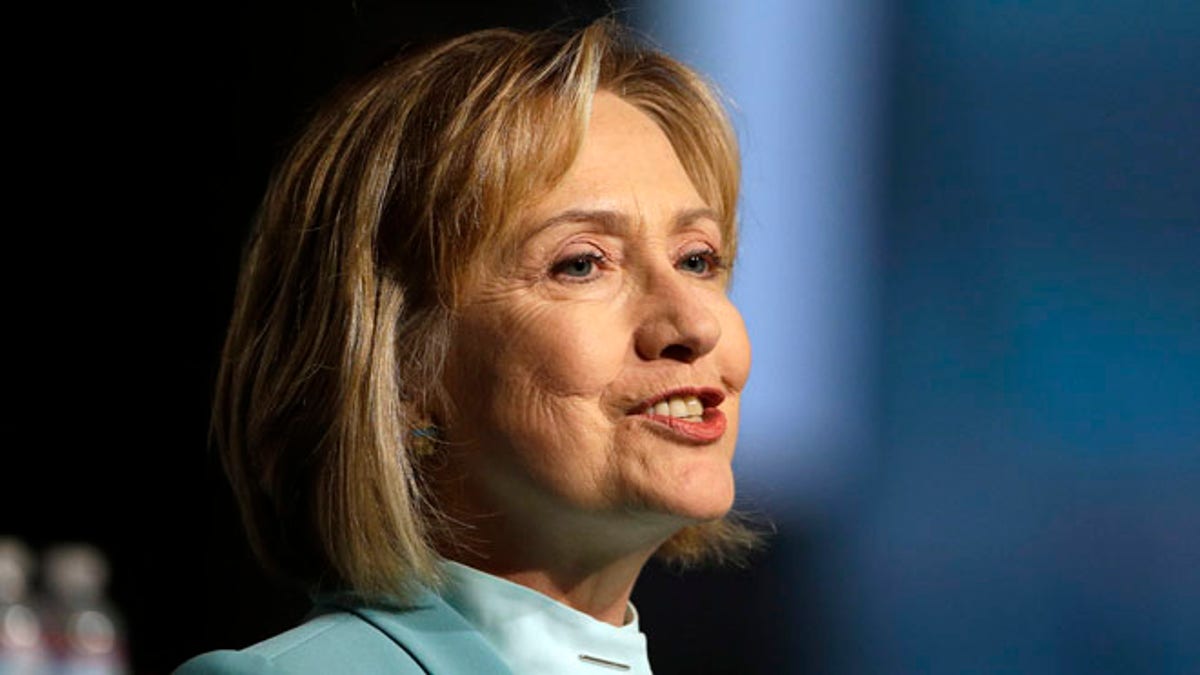
Aug. 12, 2013: Former Secretary of State Hillary Clinton speaks to the American Bar Association Annual Meeting. (AP)
Bill Clinton's advisers, midway through his tenure as president, urged him to aggressively fight back against Republican criticism, and particularly to defend "the honor" of then-first lady Hillary Clinton -- with one strategist saying Democrats were too "chicken----" to do it.
The cascade of political advice was contained in the 4,000 pages of Clinton-era documents released Friday by the National Archives. The documents cover everything from the 2000 presidential election recount to health care to Democrats' pounding in the 1994 midterm elections.
But among the most pointed memos was one from adviser Paul Begala to senior adviser Donald Baer. In it, Begala called for Clinton to "defend the honor of the First Lady" in his 1996 State of the Union address.
"The Republicans are attacking her without compunction, in part because they know the Democrats are too chicken---- to retaliate," he wrote. "So it's left to the President."
At the time, Hillary Clinton was facing several investigations over various controversies, and still dealing with the fallout from the administration's failed attempt at health care reform. Begala recommended that then-President Clinton include a line in his speech saying the criticism would be "more fairly directed at me by more candid and courageous critics."
The president did not include such a line in his address, though he did thank the first lady, whom he called "a wonderful wife, a magnificent mother and a great first lady."
The documents, which the National Archives began to release last month, continue to reveal behind-the-scenes tidbits about how the Clinton White House dealt with myriad challenges and scandals -- the documents are receiving close attention considering Hillary Clinton's potential interest in a 2016 White House bid.
A first wave of documents released in February provided insight into the Clinton administration's concern over the failed health care overhaul plan, which Hillary Clinton helped lead, and showed how advisers to the first lady tried to shape her public image.
The latest set shows advisers also urging the president not to take the blame after his party's midterm losses and instead to hit back hard. Preparing for Clinton's 1995 State of the Union speech, Begala said the president should change his tone regarding Democratic losses in the midterm elections.
"I really don't like the president making fun of our ass-whipping in November, or suggesting it was because of him we got creamed," Begala wrote in a memo to speechwriters.
He said that Clinton adviser James Carville disagreed with him. "He thinks it'll be effective self-deprecation; I'm concerned it could look like a white flag of surrender."
In a separate memo to Clinton adviser George Stephanopoulos, now an ABC News anchor, and to White House Counsel Jack Quinn, speechwriter Michael Waldman urged them to "portray the Republicans as advocates for wealthy special interests." He added, "The trick is how to do this without seeming to be an advocate of big government and red tape."
In another memo to Stephanopoulos, Waldman suggested the White House review how Presidents Richard Nixon, Gerald Ford, Ronald Reagan and George Bush "dealt with an opposition Congress -- what tricks they had up their sleeves."
The documents also show how White House aides drafted a roadmap for the approach to health care reform in the first week of Bill Clinton's presidency. The documents include warnings about prickly lawmakers who would be key to the process.
An unsigned memorandum dated Jan. 28, 1993 and entitled "Discussion with Hillary Clinton" -- the document does not make clear if it is summarizing the contents of a discussion that was already held with Mrs. Clinton, or would soon be held with her -- offered an early blueprint for her ultimately doomed health care reform effort.
The memo stated that the initiative should take the form of a "framework" rather than "a detailed bill," citing the fact that other recent legislative efforts -- tax reform under President Reagan in 1985, deficit reduction under President George H.W. Bush in 1990, among others -- had been devised that way.
The memo also cautioned against adopting a "here's the bill, there's not much time, take it to the Floor quick" approach, saying such a tactic "might fail" because "many Members [of Congress] would feel excluded" and "interest groups will object that their concerns, even those that are small or reasonable, have been excluded from the hearing and markup process."
A separate document, an undated memo that White House policy adviser Chris Jennings sent to Mrs. Clinton in advance of a critical session with lawmakers, sought to prepare the first lady for potentially clashes, possibly owing to personalities. Jennings described Rep. Peter Stark, D-Calif., then chairman of a House Ways and Means subcommittee on health, as "one of the most knowledgeable and (sometimes) feared health care legislators on Capitol Hill." Calling Stark a "fierce advocate" for his policy agenda, Jennings added that the Texan had been "paying a price" for his tenacity in that he was "probably one of the more disliked Members in the Congress."
Similarly, Jennings warned the first lady about Rep. Henry Waxman, D-Calif., at the time the chairman of a key subcommittee on the Energy and Commerce Committee, now serving out the end of his 20th term, having announced his retirement. "Known as a Medicaid guru, Waxman has pushed for increased coverage for poor populations in the absence of a national health care program," Jennings wrote. "Since his main thrust for increased coverage to the indigent has been turning Medicaid coverage options into mandates, Waxman is widely unpopular with states and Governors. Although not well-liked at the state level, he has tremendous respect among consumer interest groups."
Fox News' James Rosen and The Associated Press contributed to this report.




